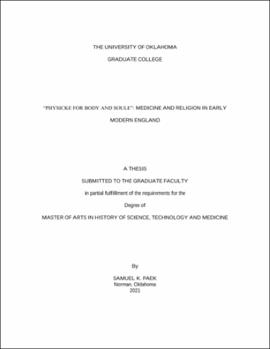| dc.description.abstract | The body and soul were intimately linked in early modern religious thought. This thesis examines one facet of this connection: the relationship between medicine and religion in published sermons, religious tracts, and demonological treatises in early modern England. Scholars such as David Harley and Andrew Wear have noted the prominence of medical metaphors within these writings; however, far less attention has been paid to both patient metaphors and the recommendation of English divines that people see a learned physician in times of need. My argument addresses these gaps in the literature and has several layers. Medical metaphors formed a crucial part of the religious writings of this period both due to their usefulness in explaining theological or spiritual points in the language of common experience, and in familiarizing the lay Christian with the connections between medicine and religion, body and soul. In other words, medical metaphors helped people not only understand spiritual matters, but also helped situate the experience of being sick within the realm of the spiritual. Beyond this, patient metaphors were indispensable in framing actual sick behaviors, such as seeing a proper physician, as a matter of deepest spiritual urgency. Indeed, the same ministers who employed these metaphors also urged people to stay away from irregular medical practitioners, such as empirics and cunningfolk, and instead to turn to the university-trained physician as the only divinely-sanctioned source of medical care. Ultimately, I argue that these metaphors and recommendations reflected an effort by English divines to regulate the piety of the lay populace by constructing medicine and medical care as a part of Christian obedience, seen foremost in their condemnation of consulting irregular practitioners as a breach of the first Commandment. While this may seem like professional protectionism on the surface, the fact that these metaphors and recommendations regarding proper medicine were enmeshed within broader discussions of Christian theology and practice indicate to me that they also reflect the genuine concern of ministers for souls. Indeed, just as the body and soul were inseparable, so also were professional and spiritual concerns, and to attempt to label this as either one or the other may be misinterpreting the complex interplay between medicine and spirituality in early modern England. | en_US |
